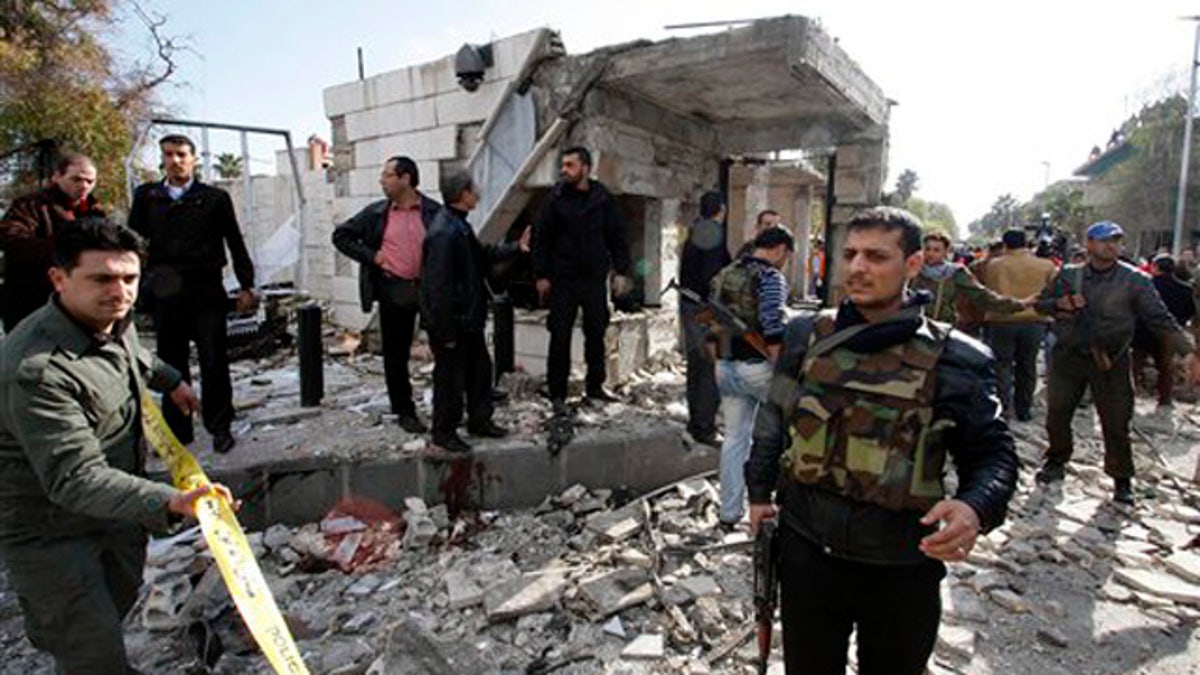
Dec. 23, 2011: Members of Syrian security are seen at the site of a suicide bombing in Damascus, Syria. (AP)
The State Department condemned the deadly twin attacks Friday on Syrian government buildings, while pressing the Assad regime not to let the violence impede a fresh effort by Arab observers to catalogue human rights abuses in the country.
Questions swirled Friday about the nature of the attacks, a pair of suicide car bombings which killed at least 44 people and wounded more than 150, according to officials.
Syrian government officials suggested Al Qaeda was behind the attacks, and pointed to the explosions as proof of its claims that it is battling not a popular uprising but terrorists intent on overthrowing the regime. But Assad regime opponents cast doubt on the account, hinting that the regime itself could be behind the attacks to make its case to Arab observers who arrived in the country only a day earlier.
State Department spokesman Mark Toner, without addressing who might be responsible for the attacks, said the United States "condemns in the strongest terms" the Damascus bombings.
"There is no justification for terrorism of any kind and we condemn these acts wherever they occur," he said in a statement. "Throughout this time we have spoken out against the violence in Syria, as we have in other countries since the moment peaceful movements for democratic change began in the region, and we will continue to do so."
Toner stressed that the "burden" remains on the regime to make sure the Arab League delegation that arrived in Syria can carry out its monitoring mission.
"It is crucial that today's attack not impede the critical work of the Arab League monitoring mission to document and deter human rights abuses with the goal of protecting civilians. We hope that this mission will proceed unfettered in an atmosphere of non-violence," Toner said.
The morning explosions left a swath of destruction, with bodies on the ground outside the headquarters of the General Intelligence Agency and a nearby branch of military intelligence, two agencies that have played a significant role in the bloody campaign against anti-Assad protests since March. All the windows in the military building were blown out and dozens of burned out cars lined the street.
The bombings were coincidental to say the least, considering the Syrian government all along has claimed terrorists were responsible for the violence in the country. The Syrian military took some of the Arab League observers straight to the bomb site.
"We said it from the beginning, this is terrorism. They are killing the army and civilians," Deputy Foreign Minister Faysal Mekdad told reporters outside the intelligence headquarters.
Regardless of who was behind the attacks, the bombings mark a new stage in the level of violence in Syria. If the regime was willing to bomb its own people, as some suggested, it would show the lengths to which they are willing to go to stay in power. If the Syrian resistance is behind the attacks, it would show that Bashar Assad is more vulnerable than was previously thought and that Syria is at a point where it could split along religious lines into the type of war that broke out in Libya - only with more firepower.
But the resistance denied responsibility for the attacks, calling them mysterious.
Omar Idilbi, a member of the Syrian National Council, an anti-regime umbrella group, called the explosions "very mysterious because they happened in heavily guarded areas that are difficult to be penetrated by a car."
He stopped short of accusing the regime in the bombings, but he said authorities wanted "to give this story" to scare observers from moving around the country and send a message that "Syria is being subjected to acts of terrorism by members of Al Qaeda."
Fox News' Leland Vittert and The Associated Press contributed to this report.












































